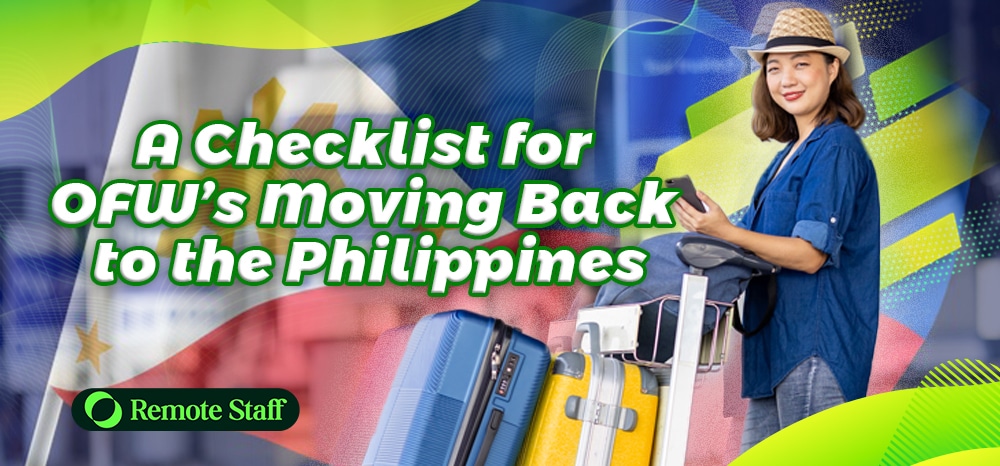Returning home after years of working abroad can be a bittersweet moment for many Overseas Filipino Workers (OFWs).
Yes, you can finally be with your family and loved ones again. However, this comes with the caveat of losing your higher-paying job abroad.
Additionally, there are many adjustments you need to make and a significant amount of paperwork to file.
To help you find your bearings, here’s a checklist of everything an OFW needs to do when returning to the Philippines.

A Key Consideration Before Returning
Before you even book your flight, consider this first:

Financial Preparedness
The most important factor OFWs must consider before repatriation is their financial stability.
Unless you have a job or source of income lined up upon returning home, you’ll probably spend weeks, sometimes months, unemployed.
Thus, you must have enough money to sustain yourself and your dependents before you commit to going home.
Savings and Budgeting for Repatriation
Returning residents need to save up long before they return to make sure they have enough money to live on.
These savings cover immediate expenses like finding a new home and/or daily living expenses while searching for a new job or starting a business.
Additionally, it provides a safety net should getting set up at a job or a business take longer than expected.
Setting (and sticking) to a budget helps you avoid financial stress. This way, you can allocate funds not just for your daily necessities, but also for future investments and emergencies.
Managing Debt and Financial Obligations
A common reason OFWs leave the country is to better support their families and pay off their outstanding loans here.
Thus, make a plan for paying off all your debts before you even start planning your return home.
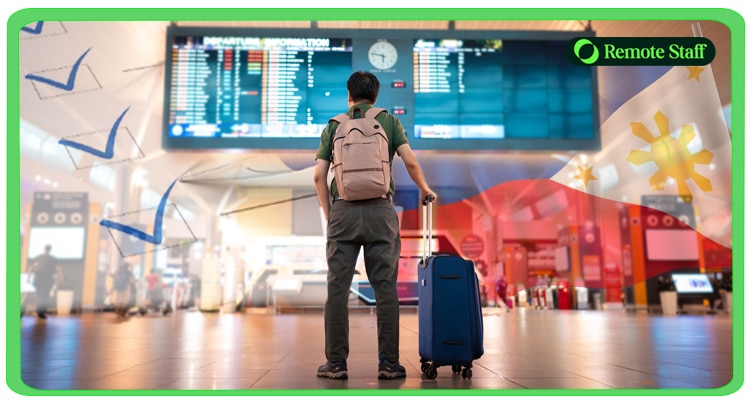
The Main Checklist for OFWs Moving Back to the Philippines
Let’s say you’ve finally decided to move back. Here’s what your OFW checklist should contain:
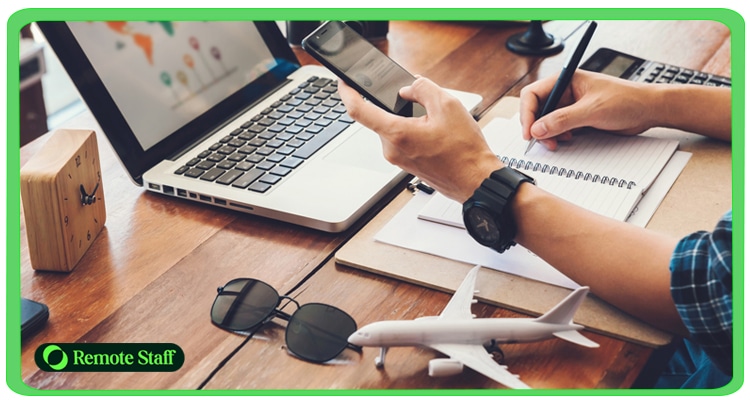
Travel and Logistics Arrangements
First up is booking your flight home and shipping your belongings to the Philippines.
Here are some tips to facilitate a smooth and stress-free return to the Philippines:
Booking Flights and Managing Cargo Shipments
Book your flight months in advance to get the best deals, especially if your departure date is during peak season.
Additionally, check your airline’s baggage policies and be mindful of the weight limits to avoid excess baggage fees.
Also, if possible, book direct flights to minimize layovers and travel fatigue. For those on connecting flights, ensure you have ample time between flights to avoid missing them.
Finally, prepare all important travel documents like your visa, passport, employment records, IDs, and proof of OFW status for customs clearance and compliance with immigration requirements.
Many OFWs also use Balikbayan Boxes to ship the bulk of their items to the Philippines to save on costs. You can check the guidelines here.
In case you’re shipping large items like appliances, you’ll need to work with international shipping companies. Document all your items thoroughly and declare their correct value to avoid customs issues.
Navigating Customs and Import Duties
If you’re bringing home personal goods, appliances, or balikbayan boxes, you’ll inevitably have to deal with customs and import duties.
Here are some pointers for handling this process:
- Balikbayan Boxes and Duty-free Privileges:
- Under RA no. 10863, OFWs can send or bring up to PHP 150,000 worth of personal goods per balikbayan box, up to 3 times a year, without paying customs duties and taxes.
- The items must be for personal use only or gifts for your family and you must accurately declare the contents of the box to avoid issues with customs.
- For more information about duty-free privileges, click here.
- Taxable Goods and Items:
- For goods exceeding PHP 150,000 or restricted items, OFWs must declare and pay customs duties (1-40% of the items’ value).
- Sending prohibited goods can lead to fines or legal trouble.
- Bringing In Large Items:
- Shipping vehicles or large appliances can be costly due to high taxes (up to 50%), and additional paperwork, especially for vehicles.
- For large appliances and electronic devices, customs may charge duties based on the value and quantity of the items.
- Customs Clearance Process:
- OFWs must also fill out a customs declaration form upon arrival, undergo inspection, and pay duties if goods exceed the duty-free limit. Keep your receipts on hand just in case.
- OFW Discounts and Exemptions:
- OFWs returning home after at least a year of working abroad are eligible for tax-free privileges under the Balikbayan program, as well as exemptions for household items under the Returning Residents Program.
- Some Tips for a Smooth Customs Process:
- OFWs must have all their passports, visas, employment documents, and receipts for high-value items ready for inspection.
- Use reputable and accredited forwarding companies when shipping goods to ensure their safe and timely delivery.
- If you’ve sent balikbayan boxes or other goods via sea or air freight, use tracking services to monitor the shipment’s progress.
- Post-Clearance Assistance:
- If issues arise with customs, OFWs can contact the Bureau of Customs or the OFW Assistance and Reintegration Program for help.

Housing and Settling In
Upon returning to the Philippines, the next item on your OFW checklist should be finding a place to stay.
Securing Permanent Housing or Temporary Rentals
Many OFWs initially stay at their family’s or relatives’ house. This helps them save a lot of time and money while they look for a place of their own.
If this isn’t an option, consider renting a temporary space like a condo, apartment, or short-term lease.
Once you’ve settled down, you can start calculating your housing budget based on your savings and projected future income. Should this fall short, you can apply for government assistance home loans in Pag-IBIG.
Restoring Utilities and Basic Services
After securing a place to stay, the next step is ensuring your new home has all the utilities and basic services installed:
- Electricity:
- If you’re moving to a previously owned home or rental, always check if it already has an existing connection and if all previous bills have been settled.
- Otherwise, apply at the local electric company.
- Prepare documents like your proof of residence, ID, and billing details, and set aside money for any necessary reconnection or activation fees.
- Water Supply:
- Contact your local water provider to check the status of the supply in your home.
- To process reconnections, submit the necessary documents like lease agreements or proof of ownership.
- Like with electricity, check if the water meter is still functioning and ensure there are no unpaid bills.
- Internet
- Select a reliable internet provider (i.e., Globe, Converge, or PLDT) and contact them for new installations or to reactivate existing lines.

Social Reintegration and Support Programs for OFWs
Were you abruptly repatriated during the pandemic or from ongoing conflict in the country you worked in?
Fortunately, the Philippine government provides repatriation assistance to OFWs during these situations:
Support Services Offered by OWWA and DOLE
The Overseas Workers Welfare Administration (OWWA) and the Department of Labor and Employment (DOLE) provide various support services for OFWs like:
- Reintegration Programs,
- Education and Training, and
- Financial Assistance.
To avail, you’ll need to present government documentation as proof of your OFW status upon your return:
- OWWA Membership Certificate,
- Philippine Overseas Employment Administration (POEA) Overseas Employment Certificate (OEC),
- Work Visa,
- A certificate issued by the Philippine Embassy, Consulate, or OWWA as proof of repatriation, and
- Your OFW Travel documents (i.e., copies of your passport showing your arrival stamp in the Philippines).
Business Start-up Assistance
Looking to start a business?
OFWs moving back to the Philippines can access several start-up assistance programs like:
- The Balik Pinas! Balik Hanapbuhay! Program:
- Offered by OWWA, this provides livelihood packages and financial support for OFWs to start their own business.
- OFW Reintegration Skills:
- A joint program by OWWA and the Land Bank, this offers low-interest loans to OFWs for their business start-ups.
- TESDA Skills Training:
- OFWs can also access free training courses in various fields from the Technical Education and Skills Development Authority (TESDA) to enhance their entrepreneurial skills.
Counseling and Mental Health Services
For OFWs who require assistance regarding their mental health, such as those coming from war-torn areas or who are leaving abusive workplaces abroad, there are several counseling and mental health services available to you like:
- OWWA’s Psychosocial Counseling Services,
- DOLE’s Assistance Program, and
- Partner LGOs and Health Agencies.
For more information about the services above, click here.

Financial Housekeeping
Financial housekeeping is a crucial part of every returning OFW’s checklist – and should be done as early as possible.
This involves:
- Tracking your income and expenses,
- Managing savings and investments,
- Clearing debts,
- Creating a budget during your transition back home, and
- Setting new financial goals.
This promotes financial stability and facilitates a smoother transition back home.

Opening Bank Accounts
A local bank account helps OFWs transfer their funds from abroad, making it easier to access funds for repatriation costs, housing, and daily expenses.
It also enables OFWs to invest, save, or apply for loans so they can start a business and/or buy a house.
Best Bank Options for Returning OFWs
Here are some popular banks for OFWs in the Philippines:
- Banco de Oro (BDO):
- BDO offers a savings account specifically designed for OFWs and their beneficiaries in the Philippines.
- Requires zero maintaining balance so long as there’s at least one remittance within each year, along with free life insurance for qualified OFWs.
- Philippine National Bank (PNB):
- PNB has a dedicated Global Filipino Program, providing OFW-friendly accounts, remittance services, and financial products.
- In addition, it offers perks like faster remittance processing and special loan facilities for OFWs.
- Bank of the Philippine Islands (BPI):
- BPI provides Pamana Padala services, which offer specialized accounts with which OFWs can send and manage remittances.
- This includes remittance protection and competitive foreign exchange rates.
- MetroBank:
- MetroBank offers OFW savings accounts and remittance services with an international reach.
- Additionally, MetroBank also provides competitive exchange rates, easy remittance transfers, and extensive branch coverage in the Philippines.
Foreign Currency Account Options
Many banks in the Philippines offer Foreign Currency Accounts (FCAs) to help OFWs manage their remittances and savings in international currencies. These include:
- Banco de Oro (BDO): Foreign Currency Savings Account.
- Bank of the Philippine Islands (BPI): Foreign Currency – US Dollar Savings Account.
- Security Bank: Foreign Currency Savings Account.
- Rizal Commercial Banking Corporation (RCBC): Foreign Currency Account.
Investments and Savings
The best way to ensure your long-term financial stability upon returning to the Philippines is through savings and investments.
Savings help cover your immediate needs; while investing your money helps you grow your wealth over time for a comfortable requirement.
Furthermore, having these in place before you arrive reduces the pressure to quickly find a different source of income – sparing you from accepting any job or investing into any business out of desperation.
Exploring Real Estate Investments
When it comes to investing, few assets are as valuable as real estate.
First off, real estate is a stable and long-term asset that increases in value over time.
Additionally, these properties can generate passive income, which contributes to financial stability.
Finally, investing in properties means you don’t have to worry about housing anymore.
When investing in real estate, it’s important to research the market first and assess your budget for it.
Furthermore, work with a reputable real estate agent who can provide you with guidance on the best properties that fit your budget and needs.
Saving Plans and Insurance Coverage
Aside from investing in properties, it’s also important to put aside money for the future and emergencies.
Having a savings plan (i.e., an emergency fund or saving up for your children’s education) and getting the right insurance coverage creates a valuable safety net for your family as you acclimate to life back home.

Essential Legal and Administrative Requirements
No returning OFW’s checklist is complete without the right documentation.
Besides legal compliance, these give you access to most government services and benefits and employment opportunities. They’re also prerequisites for key financial transactions.
Here are some of the most important ones – and how to get/update them:
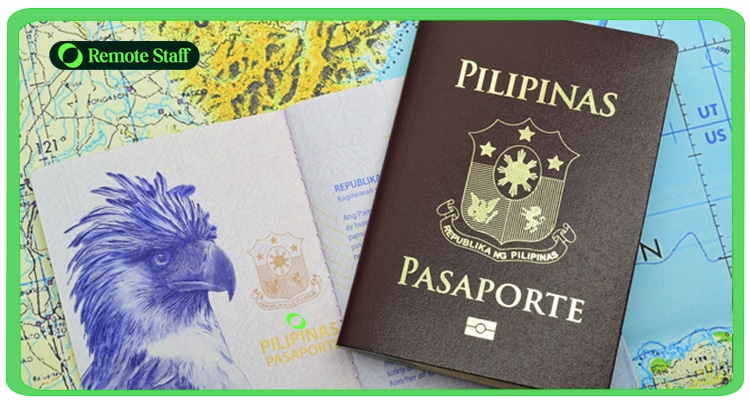
Government Documentation for OFWs
Let’s start with updating your government-issued IDs.
These include:
Updating Personal IDs and Renewing Passports:
To renew your passport, follow these steps:
- Schedule an appointment through the Department of Foreign Affairs’ (DFA) website.
- Prepare the necessary documents like your old passport, a valid ID, and any supporting documents like your Overseas Employment Certificate (OEC), if necessary.
- On the appointment day, go to your assigned DFA office on time for document verification and biometrics capture.
- Pay the application fee (around PHP 950 for regular processing and PHP 1200 for expedited processing).
When updating your IDs:
- Keep updated proof of identity, address, and employment documents on hand.
- Visit the issuing government office for each one (e.g., DFA, SSS, LTO, etc).
- Always check the requirements on the official websites of these agencies beforehand.
Ensuring Compliance to PhilHealth, SSS, and Pag-IBIG
Continued compliance with government programs like PhilHealth, Social Security Service (SSS), and Pag-IBIG keeps returning OFWs eligible for financial, health, and housing benefits:
- PhilHealth Compliance:
- Visit the official Philhealth website to make sure your membership is active.
- Settle any pending contributions you may have accrued while abroad to avoid lapses in coverage.
- Update your employment status from OFW to local or self-employed as needed.
- SSS Compliance:
- As a returning OFW, you can continue making voluntary contributions to SSS to remain eligible for retirement, disability, and other benefits.
- Enroll in the SSS online platform to monitor your contributions and conveniently manage your payments.
- Update your SSS records if you’ve changed your job status to avoid discrepancies in your contribution history.
- Pag-IBIG Compliance:
- Check the status of your Pag-IBIG membership by visiting their website or visiting the nearest branch.
- Keep contributing to Pag-IBIG either as a self-employed or voluntary member, depending on what is appropriate.
- Keep your Pag-IBIG records updated to reflect any changes to your employment status or address.
For a guide to converting your SSS, Pag-IBIG, and PhilHealth status to self-employed, click here.
For the complete guide to getting government IDs and passports, click here.
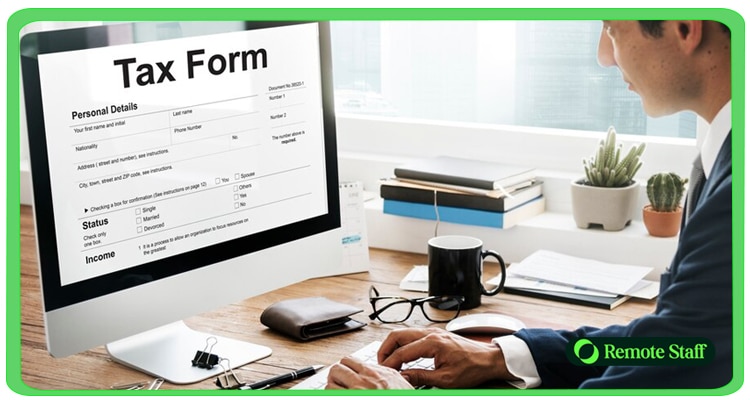
Taxes and Pension Claims
Aside from updating your government documents, getting your taxes and pension claims in order should be high on your OFW checklist.
This helps you avoid penalties and ensures you’ll receive your pension after retirement.
Filing Tax Returns and Addressing Obligations
Fortunately, OFWs don’t pay income tax on overseas earnings.
However, if you generate income like business profits or salaries locally, these are subject to taxes.
Thus, if you’re planning to start a business or get a local job, you should register with the Bureau of Internal Revenue (BIR) to ensure proper tax compliance.
Finally, settle any unpaid taxes from prior local earnings or penalties immediately.
Accessing Retirement and Pension Benefits
To access your retirement and pension benefits from SSS, start by applying through your My.SSS account or by visiting your nearest SSS branch. You’ll need a valid ID, proof of contributions, and in some cases, a bank account under your name.
To qualify, you must be at least 60 years old and have paid a minimum of 120 (about 10 years’ worth) monthly contributions.
Qualified members can choose between getting a lump sum or a monthly pension. For more information, click here.
For Pag-IBIG members, you can claim your savings upon reaching at least 60 years old, a minimum of 240 (about 20 years’ worth) monthly contributions, or have a permanent total disability.
To claim it, you must prepare your Client Application Form, two valid government-issued IDs, your Pag-IBIG Membership Identification (MID) Number, and proof of contributions. For direct deposits, you must also have an active bank account under your name.
Once you have all these documents, visit your nearest Pag-IBIG branch. For more information, click here.

Employment and Career Transition
Once you’ve settled in and accomplished all government paperwork, it’s time to find a new job.
Typical Problems That OFWs Experience When They Come Home
Some of the most common challenges OFWs face upon coming home include:
- Employment and Career Adjustment:
- OFWs may find it hard to secure employment that matches their overseas experience or salary.
- Reverse Culture Shock:
- Reintegrating into local culture and adjusting to changes that occurred during their absence can lead to stress and a sense of disconnection.
- Financial Strain:
- Many OFWs return home without sufficient savings or face difficulties managing their finances.
Income Challenges: Matching What You Used to Earn as an OFW
Perhaps the most common challenge many returning OFWs face is finding employment opportunities similar to what they received abroad.
Typically, the Philippine job market doesn’t offer the same salary levels nor benefits as their overseas counterparts. This severely hampers their ability to maintain their previous lifestyles and support their families.
Furthermore, some OFWs may find that their current skills aren’t as in-demand or as well-compensated in the Philippines.
A Way Out: Pivoting by Acquiring New Skills
To improve their chances of landing a well-paying job back home, many OFWs are expanding their current skill sets via upskilling. They do so by enrolling in online courses, joining workshops or seminars, and seeking professional development opportunities.
This doesn’t only enhance their employment prospects but also gives them more flexibility in choosing their careers.
Beginner Skills That Pay Higher Than Average: VA, Admin Assistant, Etc.
Today, remote jobs typically pay more than their local office-based counterparts, not least because the clients are usually from abroad offering compensation in foreign currency such as US dollars.
Additionally, some of these jobs require specialized skills that command a higher price on the international market.
Thus, when upskilling, OFWs should consider learning the following:
- Virtual Assistance:
- In-demand skills include proficiency in productivity tools (Google Workspace, Microsoft Office tools), scheduling, and customer support.
- The average monthly salary for these roles ranges from PHP 17,000 to PHP 25,000 for beginners, and PHP 50,000 to PHP 60,000 for expert-level virtual assistants.
- Administrative Support:
- These often involve working with project management tools (Trello, ClickUp), communication platforms (Slack, Zoom), and cloud storage solutions (Google Drive, DropBox).
- Digital Marketing:
- Key skills in this field include social media management, Search Engine Optimization (SEO), content marketing, and data analytics.
- The average monthly salary for digital marketing specialists range from PHP 22,000 to PHP 45,000.
- Content Writing:
- To be an in-demand content writer, you’ll need good research skills, familiarity with SEO writing, adaptability, and proofreading and editing skills.
- The monthly salary range for content writers ranges from PHP 20,000 to PHP 28,000 for entry-level positions, and PHP 40,000 to PHP 50,000 for expert-level positions.
- Graphic Design:
- In-demand graphic designers are proficient in design software (Adobe Photoshop, Canva) and have considerable artistic creativity, with an understanding of branding concepts like imagery, typography, and color theory.
- The average earnings for beginner graphic designers range from PHP 18,000 to PHP 29,000 per month to PHP 50,000 to PHP 60,000 per month.
- Project Management:
- Key Skills for this role include strong organizational skills, communication and collaboration, excellent problem-solving skills, and familiarity with project management tools (Trello, Clickup).
- The monthly salary range for this position ranges from PHP 30,000 to PHP 35,000 for beginners and PHP 80,000 to PHP 100,000 for experienced experts.

Success Stories of Returning OFWs
Let’s now take a look at some real-life stories of former OFWs who successfully made the transition back to the Philippines:
Ryan (Real Name Withheld Upon Request)
Let’s start with Ryan’s story.
Ryan worked in Japan as an Assistant Language Teacher for English in 2021.
He returned in 2023, feeling burned out from the work culture there after two years.
Like many other returning OFWs, one of his main struggles upon returning home was finding a new job.
Fortunately, due to his familiarity with foreign languages, he was able to find good job opportunities.
Currently, he’s working freelance as an interpreter, translator, and tutor, where he’s able to apply his Japanese language skills and still work with foreign clients.
Lois Gabriel
Lois Gabriel was an OFW based in Dubai for six years back in the early 2000s, where she used her communications degree and organizational skills to make a living planning events.
Upon returning home to start a family, she decided to put up Lois Gabriel Events, where she wears multiple hats as an event coordinator, host, and professional makeup artist.
That said, her first attempt at establishing her business wasn’t successful.
This setback didn’t deter her, and she soon took up makeup artistry at the School of Fashion and Arts (SOFA) in 2008.
She then launched her makeup artistry page while still offering event coordination services, and that led to the successful rebirth of Lois Gabriel Events.
Currently, she has five people on her full-time staff and a few more on-call if she needs extra hands for event bookings.
For more details about her story, click here.
Maxine Pascual
Maxine Pascual is another former OFW who was based in Dubai, where she worked for 19 years.
Despite having a good job in a renowned company there, she struggled with homesickness and missing important events in her family’s lives.
Furthermore, the company was also downsizing, and she knew it was only a matter of time before she was let go.
So, when she came back to the Philippines, she tried online freelancing instead of returning to a corporate job.
Initially, no company responded to her applications.
Frustrated but undeterred, she enrolled in a virtual assistant (VA) online course, and even applied to call centers. She was then offered a job on a night shift, but she turned it down since she deemed it impractical.
Then, in 2017, she enrolled in a VA masterclass that helped her learn valuable lessons in becoming a virtual assistant.
It took a few more tries afterwards, but thanks to that masterclass, she finally landed her first virtual assistant job – and she’s been thriving since.
For more details about her story, click here.
April Ocampo
Finally, let’s take a look at April Ocampo’s story.
April Ocampo was an OFW in Macau and Singapore who initially returned to the Philippines while on maternity leave in 2020.
The pandemic hit not long after, and she ended up unemployed for the next three years, so she became a full-time mom.
Because she was used to working towards a thriving career, she experienced post-partum depression.
She initially decided to put up a business to help combat these thoughts and to feel like herself again.
In January this year, she established Bounty Honey, which distributes wild honey from Mindanao.
She initially started with eighteen bottles of honey and a capital of PHP 3,200. Now, business is booming with consistent demand for her products.
For more details about her story, click here.

FAQs
Here are some commonly asked questions by OFWs about moving back to the Philippines:
Are There Any Specific Government Programs to Assist OFWs Who Want to Start a Business?
There are many government programs that do just that.
These include:
- Balik Pinas! Balik Hanapbuhay! Program by OWWA.
- OWWA’s Reintegration Program for OFWs, in collaboration with the Land Bank of the Philippines. For more information, click here.
- Enterprise Development and Loan Program (EDLP) by OWWA in collaboration with the Land Bank and Development Bank of the Philippines.
Can I Transfer My Overseas Pension Contributions to a Philippine-based Retirement Fund?
Unfortunately, it isn’t possible for returning OFWs to directly transfer their overseas contributions to Philippine-based retirement funds, as pension systems vary by country and there’s no universal system for pension transfers yet.
However, OFWs can still build their retirement funds by making voluntary contributions to SSS to boost their retirement savings.
Additionally, they can also join the Flexi-Fund Program, which is like a special savings fund for OFWs.
Aside from this, Pag-IBIG offers programs like the MP2 Savings program for OFWs to build up housing and retirement savings.
What Support is Available for Children of Returning OFWs in Terms of Education?
The government offers several programs and scholarships to support the children of returning OFWs like:
- OWWA Scholarship Programs:
- OWWA provides educational scholarships like the Education for Development Scholarship Program (EDSP) and OFW Dependent Scholarship Program (ODSP) for the children of active members.
- CHED Scholarship Programs:
- The Commission on Higher Education (CHED), also offers scholarships for college students.
- Although not specifically for the children of OFWs, these programs can help eligible OFW dependents access financial support for their education.
- Local Government and DSWD Assistance:
- The Department of Social Welfare and Development (DSWD) and some local government units (LGUs) also provide educational assistance for the children of OFWs, particularly those from low-income families.
Adjusting to life back in the Philippines can be a difficult and lengthy process for many OFWs.
Fortunately, it doesn’t have to be this way.
By following the OFW checklist above, you’ll have an easier time acclimating to life in the Philippines once again.
Good luck, and welcome back, kababayan!

